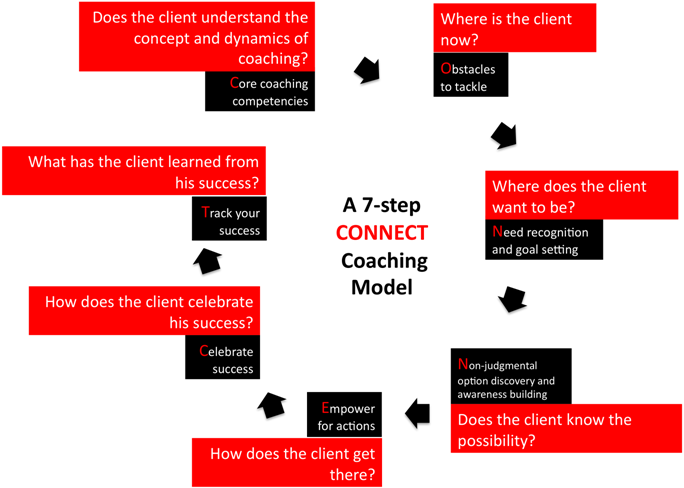A Coaching Model Created by Darren Chong
(Intercultural Coach, POLAND)
Merriam Webster defines the meaning of CONNECT as:
To become joined, to establish a rapport or relationship, to establish a communication connection, to join or fasten together usually by something intervening.
Reasons for choosing “CONNECT” as the name of my coaching model is:
In coaching, the connection between the coach and the client has a vital impact in building a long term coaching relationship. Both the Coach and client, regardless of the diverse roles they play are joined and connected as one unit to work on the best interest of both parties, which is the successful completion and attainment of target goals.
Step 1 Core coaching competencies (Does the client understand coaching?)
Coaching is a relatively new field and many clients have no knowledge about coaching. By explaining to a client what coaching is all about and my qualification as an accredited coach by International Coach Federation (ICF) helps to convince a client the skill I posses to be an effective coach and how the concept of coaching operates within a professional framework. Further, highlighting the ICF 11 core competencies and the ethical guidelines also offers the former the opportunity to report breaches of its ethical guidelines.
Step 2 Obstacles to tackle (Where is the client now?)
A Coach needs to understand the problems, challenges, issues and situations his client is facing. Utilizing the “Wheel of Life” exercise provides the client a clear picture of his current circumstances, enables him to assess what is good from the ones that are off balance, which in turn assists in identifying specific areas that need more attention and focus.
Step 3 Need recognition and goal setting (Where does the client want to be?)
A Client to make sure the goal he is working for is something he really wants, not just something that sounds good, It is also important that goals must be consistent with client’s values. SMART goal is a good tool in goal setting process.
Step 4 Non-judgmental discovery and awareness building (Does the client know the possibility?)
As Tao Tzu said, Knowing others is wisdom, knowing yourself is Enlightenment.
Self-awareness is a very important stage in coaching which helps a client understand why he feels what he feels and why he behaves as he behaves. This understanding then gives him the opportunity and freedom to change those things he would like to change about himself and create the life he wants. Without fully knowing who he is, self-acceptance and change become impossible.
Powerful questions and varied coaching tools can be used to gather more information about a client’s problems, goals, motivations, desires, skills, values, beliefs, intentions, options and strategies. The Coach, on the other hand, has to make the greatest effort to listen with an open and curious mind without judging the client, after all,the client seeks to be in a safe, trusting, honest and non-judgmental atmosphere. Coaching sessions should centre on the client’s emotions, thoughts, values, beliefs, feeling and background experience. Being a judgmental coach offers no benefits for the client, a coach must always hold the big picture and never be narrow-minded.
Step 5 Empower for action (How does the client get there?)
Coaching is all about taking action. If the client wants to achieve or change something in life, he should be more pro-active to make the greatest possible effort to move forward and commit with the actions or strategies identified throughout the coaching session in a stipulated timeframe.
A Coach plays an important role in encouraging commitment to action and the development of lasting personal growth and change by creatively applying the powerful and right coaching tools and techniques. Nobody will ever achieve anything by merely talking about it. An effective coach is always there to support and fill the client with confidence and self-belief to go out there to achieve his full potential.
Step 6 Celebrate success (How does the client celebrate his success?)
A Client cannot achieve his goals in hours or in days. It might take more than 3 months, 6 months or even 12 months to achieve success. If a client is taking action just so he can use his red ink pen to cross off an item on his to do-list, he is producing nothing of value. In coaching, a client should be proud enough of his goals that he has no problem celebrating when he reaches them. Even though the success is small, it does not mean that this success is not worthy. No matter how small this success may be, a Client should learn to appreciate and celebrate it, in any way he desires.
Step 7 Track your success (What does the client learned from his success?)
After all the success celebration, step 7 allows the client to reflect on how far he has come, what he has learnt and how to use those same tools again in the future. Both the client and coach will recall and evaluate how the coaching partnership has brought in success.
This step is great from a marketing point of view as the client might come back to you as coach to work on a different issue or will refer you to other clients. All in all, this step is crucial as many coaches end the coaching relationship after celebrating success. However, a client does actually care about post-success support that might serve as reference or role model.
After achieving and celebrating his first success, it is best that the client re-evaluates his experiences, which allows client to take a moment and reflect on his success
